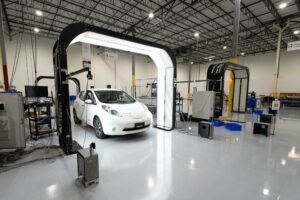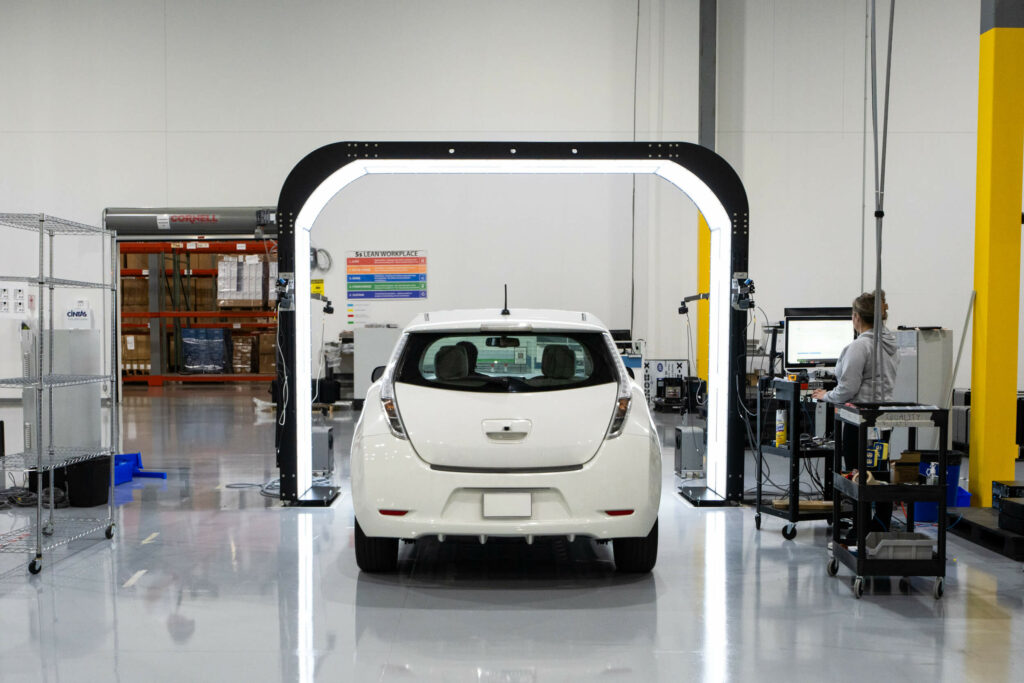
AI vehicle inspection company UVeye plans to mass produce systems
By onTechnology
Artificial intelligence (AI) vehicle inspector UVeye says it’s teaming up with another company to mass produce AI vehicle inspection systems in North America.
UVeye said Monday that it’s working with Hypertec, a sustainable technology company, to make and distribute UVeye’s three main drive-through inspection systems. This includes:
-
- Helios, “an underbody scanner equipped to detect a wide range of issues, including frame damage, missing parts, fluid leaks, and brake and exhaust system problems;”
- Artemis, “a tire quality inspection system that rapidly identifies tire brand, technical specifications, air pressure, tread depth, sidewall damage, tire mismatches, and alignment issues within seconds; and
- Atlas and Atlas Lite, “UVeye’s 360-degree vehicle exterior detection system which automatically detects damages such as scratches, dents, and imperfections.”
According to UVeye, the latter system “meticulously examines sheet metal and external body components like bumpers, door locks, grilles, and windows.”
“Our drive-through inspection systems have consistently demonstrated exceptional performance, detecting 96% of existing vehicle problems within seconds, in contrast to less than 25% accuracy for traditional manual checks,” said Amir Hever, UVeye’s CEO and co-founder. “The demand for our technology has grown exponentially since its debut in North America at CES 2020 with hundreds of car dealerships, auction houses, and fleets eagerly awaiting our increase in production.
“We are confident that partnering with Hypertec will propel us to the next level.”

Yaron Saghiv, UVeye’s chief marketing officer, said the systems can benefit independent collision repair centers by streamlining estimates and providing a faster, more transparent customer experience.
“UVeye can help detect scratches, dents, exterior damage such as bumpers alongside underbody and frame issues below and tire sidewall and tread depth just within seconds of driving through the system,” Saghiv told Repairer Driven News. “Some of the benefits for collision centers are streamlining intake documentation, time reduction, and elevated customer experience; [a] visual tool for estimators, detecting missed damages and [reducing] human error, [and a] smoother claims process with insurance companies.”
UVeye has already partnered with the Tom Wood Automotive Group in Indiana and is scaling with others, Saghiv said.
The systems are used on a lease model and cost between $6,000 and $7,000 a month including training, maintenance, and upgrades, Saghiv said. He added that the package amount depends on the amount of required scan volume, service lanes, and the quantity of systems.
He said as the systems detect exterior visual issues, they cannot detect an issue that’s internal inside the engine. However, he said most mechanical issues have some indication in the underbody that would allow the system to detect issues.
The systems will be produced at Hypertec’s facilities in Plainfield, Indiana and Montreal, Canada.
UVeye originally focused on developing a way to automatically scan Israeli vehicles for terrorist bombs. After one threat scan also noticed an oil leak, the company tweaked its AI and found it could also spot cracks, dents, and rust on the chassis, Hever has previously said.
General Motors is among the automakers already using UVeye. In July 2022, more than 4,000 GM dealerships became eligible to purchase its automated systems to inspect damaged vehicles.
Also last year, Volvo said UVeye would be used at its dealerships and is an option for repairers as well to “improve customer satisfaction and business efficiencies.”
UVeye can be used on all vehicles, including electric vehicles (EVs) and autonomous vehicles (AVs) because its databases and inspection algorithms are continually updated with the most current information on EVs and advanced driver assistance system (ADAS) platforms.
Featured images
Images courtesy of UVeye
